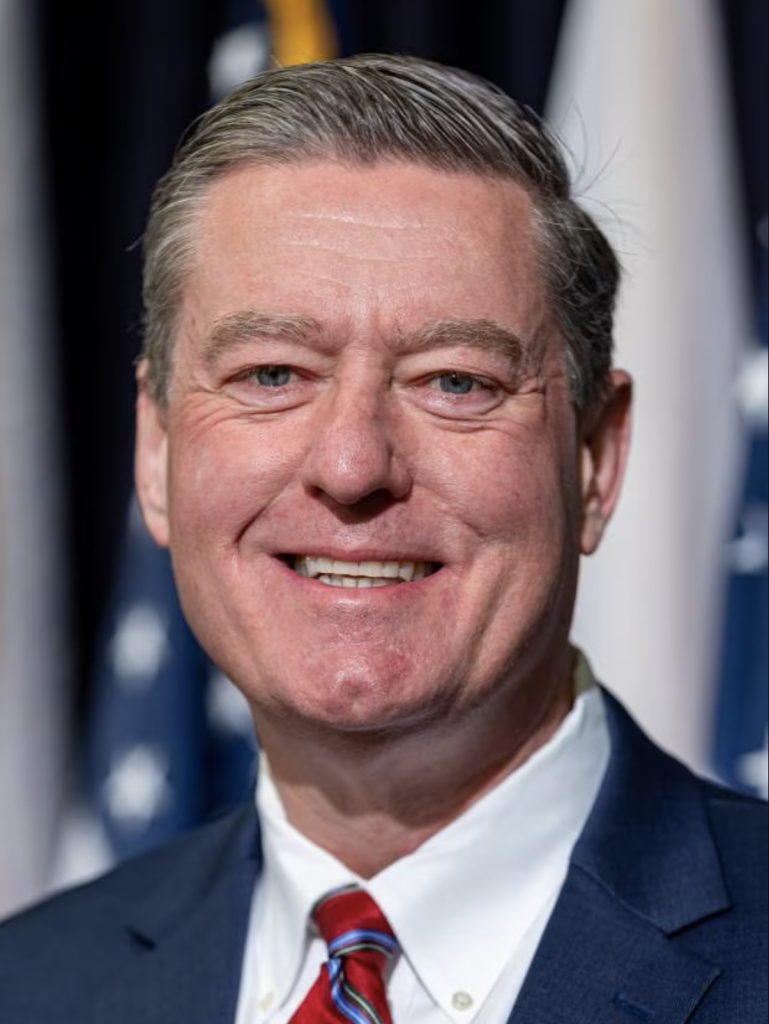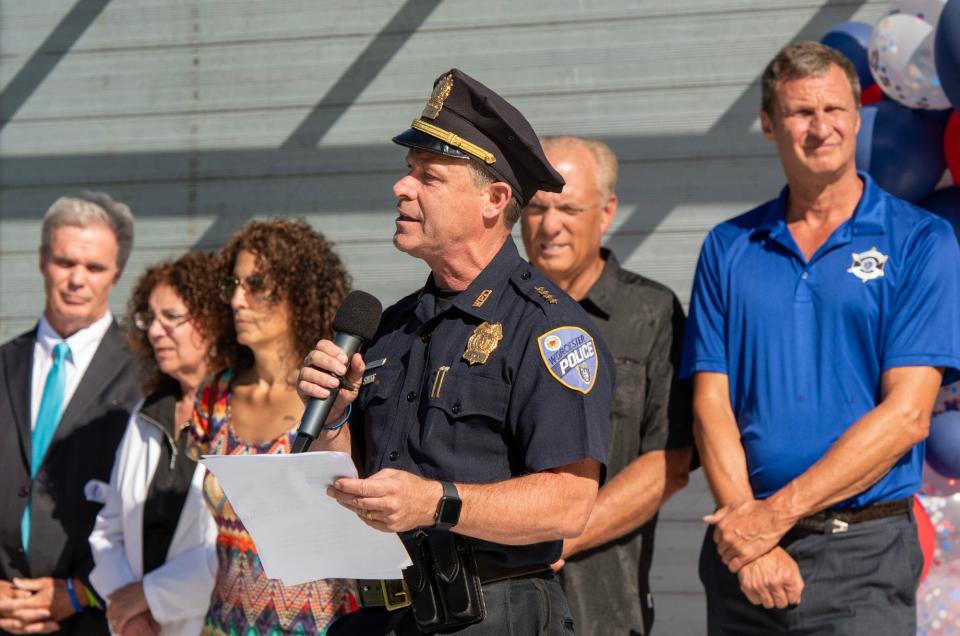43 recommendations for improvement: What to know about the Worcester police equity audit
WORCESTER ― A 100-plus-page equity audit of the Worcester Police Department recently released by the city contains nearly three dozen findings and corresponding recommendations on a broad range of topics.
The auditors, in addition to finding that police collect insufficient demographic data and arrest people of color at disparate rates, made suggestions ranging from ideas to improve officers' mental health and morale to suggestions for better training and community engagement.
What follows is a summary of the scope of the audit and its recommendations, with emphasis on those the auditors labeled as highest priority.
Who audited the department?
The audit was conducted by the Center for Naval Analyses, a large research and analysis nonprofit funded by the federal government and based in Arlington, Virginia.
The city hired CNA two years ago after former City Manager Edward M. Augustus Jr. ordered the equity audit — and a similar audit of City Hall — as part of a slate of executive actions in response to protests over racism following the police killing of George Floyd in Minneapolis.

According to its website, CNA has audited many departments nationwide, including police in Minneapolis and Philadelphia.
What did the auditors do?
According to the audit, the six authors of the report spoke to Police Department staff, conducted an anonymous internal survey with a response rate of about 25%, held two public input sessions that had 25 attendees and spoke with a number of outside community groups.
The authors said they conducted “31 semi structured interviews with WPD leadership, line staff, City of Worcester leadership, as well as local advocacy groups, nongovernmental organization members, and community members.”
They also reviewed a host of documents, from policy and training manuals to administrative crime data including arrests and citations.
The auditors focused their review on six main areas: diversity, equity and inclusion (DEI); recruitment, hiring and promotions; policies and practices; community-oriented policing; use of force; and complaint processes.
The researchers made 35 findings and 43 related recommendations, which they grouped in an appendix and prioritized into level 1, 2 or 3.
What were the level 1 recommendations?
Consider establishing a civilian review board
Auditors wrote that Police Department survey respondents and community members “perceived bias and favoritism in how complaints and disciplinary actions are handled” by the department’s internal affairs division.
“The WPD should engage in formal conversations with the City of Worcester to discuss the establishment of a civilian oversight body,” they recommended.
A number of community organizations requested the city create a civilian review board with subpoena powers following the death of Floyd. Police union leaders opposed the idea, and it has not been implemented.
Asked Wednesday if he had a position on the topic, City Manager Eric D. Batista said through an email from a spokesman that he “continues to have conversations regarding CRBs with community partners.”
Establish a citizens advisory council
Finding that there are “no active formal mechanisms to regularly gather community input on WPD policing strategies, priorities, operations, and current practices,” the auditors said the city and the department should establish a citizens advisory council “at the commander level to address specific local issues in the community.”
Acknowledge past incidents
The auditors wrote that interviews with community members revealed tensions surrounding comments former Chief Steven Sargent made denying that he had seen racism in the department. They suggested the department “publicly recognize the findings of this audit's data analysis that identify disparities, and it should take steps to acknowledge past incidents involving communities of color,” including at community meetings.

Increase use of force data
Auditors found the Police Department “collects relatively little information about use-of-force incidents and does not collect data on the race of involved community members.
“This hinders useful analysis of these data and does not allow for developing an understanding of any disparities in use-of-force incidents,” they wrote.
Researchers said the department “should update its use-of-force database to add additional fields, capturing demographic data about the involved community member (age, sex, and race), a unique identifier (e.g., name) for each involved community member, and additional details about the incident.”
Expand police training in fairness and impartiality
The auditors wrote that they frequently heard from community members of color that officers have been “discourteous, unhelpful, or aggressive” in interactions.
The feedback, they noted, contrasted with police survey responses, in which 40% agreed the Police Department has a positive relationship with the community.
Auditors said that while they couldn’t conclude to what extent the concerns are accurate, the “opposing views highlight a potential disconnect” between the community and the Police Department, and the allegations “call attention to the pressing need for enhanced accountability and supervision in the department.”
Auditors wrote the Police Department should “expand its fair and impartial and community-oriented policing training curriculum for all officers in collaboration with the community.”
Develop a community policing plan
Finding that the Police Department “does not have a clear plan to guide its community policing strategy,” auditors suggested that its neighborhood response team, which serves as one of its primary means of community policing, should, in collaboration with other department members, “develop a formal plan for improving community engagement for the department.”
Additionally, auditors suggested the Police Department develop a structured plan for its engagement with at-risk youth, expand the roles of its diversity and LGBTQ+ officers, and get all officers on the force involved in community engagement efforts.
Improve field training
The auditors said the department’s field training program “could be characterized as ad hoc in nature, lacking a cohesive and strategic approach,” and said this could “lead to variability in the training process, potentially hindering the development of officers and the adoption of best practices in areas that can impact fair and impartial policing.”
The auditors recommended the department “continue to revamp its field-training program using nationally recognized self-evaluation approaches and formalize the program in WPD policy.”
Develop a “robust” DEI plan
Auditors found that while the department does have a recruitment plan aimed at diversifying the department, it doesn’t have a “strategic plan focused on improving DEI,” and recommended it develop a “robust and specific DEI plan.” They also said the department should consider getting more feedback from officers on DEI policies, procedures and practices, such as in the form of surveys or focus groups.
Amend recruitment policy
The auditors suggested the department amend its recruitment policy “to articulate its commitment to actively diversifying its workforce through targeted outreach efforts.”
They found the department has “limited diversity and does not have a robust or specific plan to hire for diversity within the department.”
They said the department is trying to increase diversity, but hasn’t had enough success — noting many other departments are also struggling — and suggested more specific policies or consideration of hiring an organization that specializes in recruitment.
Amend social media policy
Auditors said many community members expressed concerns about posts officers or officer groups have made on Facebook. They suggested the department strengthen its policy around social media in multiple areas.
Body-worn camera review
Auditors said police “should continue efforts toward conducting a thorough community review of its BWC policy and program that includes community stakeholders. It should also establish a structured framework for conducting mandatory annual assessments of the BWC program.”

What were the level 2 recommendations?
Prioritize enhancing collaboration and communication with the Human Rights Commission
Enhance the Police Department's ability to gather data that identifies racial or ethnic disparities in such areas as use of force, traffic stops, pedestrian stops and field contacts
Collaborate with local stakeholders to establish new arrest diversion strategies for youth
Post draft policies on the Police Department website for public comment
Integrate community feedback into the expansion of the crisis intervention training curriculum
Commit to improving language translation services to enhance communication with all immigrant groups living in Worcester
Post racial demographic information online regarding use of force incidents
Internal affairs should expand on the data that it collects related to racial disparities, enabling it to conduct more extensive analyses and address problems
Mental health, wellness services critiqued
Another level 2 priority was a recommendation that the Police Department “should conduct a comprehensive review of its officer wellness support and develop a plan to expand the availability of support services for its rank and file.”
Auditors said interviews with Police Department staff “revealed that many staff members are not fully satisfied with the wellness support that is available to them, and they would like to see this improved, with various options available to access mental health assistance.”
They noted that 65% of officers who took the survey reported experiencing traumatic events “very often” in the past year, which they said underscores a need for mental health services being prioritized.
“There is a growing awareness of the impact of ongoing trauma experienced by officers on the streets leading to potential behavioral challenges that can affect their performance and well-being over time,” researchers wrote.
Researchers included in the report a number of survey responses they deemed concerning including one in which 48% of officers disagreed that they would recommend the Police Department as a workplace to others.
"In response to a question about recommendations for improving the WPD, staff expressed a need for improved overall training, increased representation of minority groups in the department, and measures to address the perceived 'toxic' culture of the department," they wrote. "Some WPD officers believe that the department’s culture and atmosphere have become deeply corrupted."
The researchers added that some officers "raised concerns about the potential for accusations of racism to tarnish officers’ reputations.
"They held the belief that police are susceptible to being unfairly labeled as racist, resulting in a lasting stain on their reputation, even after a claim has been proven false. Respondents claimed that this has led to lowered morale among officers, who feel a lack of genuine concern from both the City and its leaders regarding their well-being and reputation."
The department is currently facing a separate civil pattern-or-practice probe from the U.S. Department of Justice, which said in November 2022 it found “significant justification" to investigate whether police engage in a “pattern or practice of racially discriminatory and gender-biased policing," and use excessive force.
While the auditors touched upon racial disparities in arrests and identified deficiencies in the department's use-of-force reporting mechanisms, they did not adopt the same scope of inquiry or reference the looming federal probe in their report.
The auditors also did not specifically mention many of the court cases or settlements involving police that have brought scrutiny on the department in recent years.
Auditors also listed many recommendations they labeled as level 3 including considering withdrawing the department from civil service requirements, posting demographic data about arrests and disparities online, expanding critical incident training to all officers and analyzing use-of-force data for racial disparities annually.
What are city and police officials saying about the audit?
City councilors Tuesday authorized Batista to petition lawmakers to allow Worcester to exempt the chief and district chief positions from civil service, which would allow a nationwide search for a police chief.
The police union that represents lieutenants, sergeants and captains is opposed to its members being removed from civil service and that isn’t on the table at present. The union that represents rank-and-file officers agreed to study the issue with the city as part of its recent contract agreement.
The T&G has reached out to both unions to offer comment on the audit.
Councilors put a larger discussion of the audit on hold Tuesday and Interim Police Chief Paul B. Saucier will not be commenting publicly on the audit until after that discussion, a spokesman said.

Batista's spokesman, Tom Matthews, provided answers to questions from the T&G in an email, saying Batista did not have time for an interview.
Asked what the process will be for evaluating the audit's recommendations, Matthews said the administration “has and will continue to evaluate the recommendations internally, along with Interim Police Chief Saucier, and engage community members and employees.”
He said none of the recommendations have explicitly been decided against and that there are recommendations the department is already following, such as sharing additional data publicly.
Matthews wrote that arrest figures “make it clear that youth are overrepresented in arrests,” and said the department is committed to helping lower the numbers and to use arrest as a “last resort for juveniles.”
Matthews said the Police Department has committed to reviewing all its policies for potential improvement including suggestions from the Center for Naval Analyses regarding juvenile arrests and social media.
“In October, the department launched the Police Review Committee with a member from every division and its two DEI officers,” he wrote. “The committee is working in conjunction with the Human Rights Commission to review the policies which are also online for the public to review. The public can submit their comments to the committee via email.”
Asked whether he’d push back on any of the audit’s findings, Matthews said Batista “recognizes that it was clear in the report that some members of the community are looking for better engagement with the police department.
“The department has recognized that as an area for improvement itself and in addition to existing community policing programs is launching new community policing initiatives including park and walks and additional attendance at community meetings.”
Matthews noted that most police employees who took the survey had “generally positive sentiments regarding the department’s treatment of employees, irrespective of race, gender, or ethnicity,” and that the auditors “applauded the City for its comprehensive range of training courses that promote fairness and impartiality and establishing positions dedicated to improving DEI.”
Matthews said the audit “did highlight an issue the department was already aware of — minority groups are underrepresented in the police department’s ranks, with 80 to 84 percent of personnel being white from 2015 to 2021.”
He said the department is working to increase diversity in several ways including meeting with community groups like the NAACP and Black Families Together, developing a mentorship program for officers and coordinating with Batista’s office to contact the Massachusetts Civil Service Commission about “expanding the department’s residency and age requirements.”
Asked about Batista’s discussions with Saucier on the audit, Matthews wrote the chief was “responsive to the report and shared actionable ideas of ways the department can respond to some of the findings and detailed much of the work the department is already doing.
“Interim Chief Saucier recognizes that allowing the community to engage in the policy review process is critical for the department.
“Both Interim Chief Saucier and City Manager Batista know that developing an open dialogue with the community builds better relationships between the community and police, which ultimately leads to safer communities.”
Racial equity audit by Michael Elfland on Scribd
This article originally appeared on Telegram & Gazette: Worcester Police Department equity audit: Here's what to know

